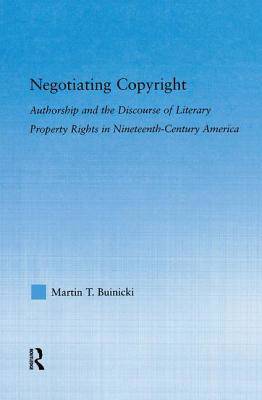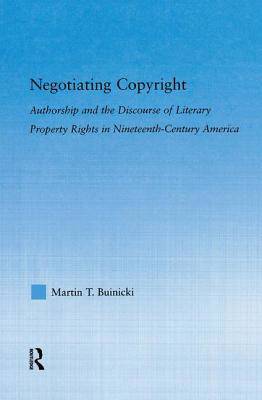
- Retrait gratuit dans votre magasin Club
- 7.000.000 titres dans notre catalogue
- Payer en toute sécurité
- Toujours un magasin près de chez vous
- Retrait gratuit dans votre magasin Club
- 7.000.0000 titres dans notre catalogue
- Payer en toute sécurité
- Toujours un magasin près de chez vous
Negotiating Copyright
Authorship and the Discourse of Literary Property Rights in Nineteenth-Century America
Martin T Buinicki
74,95 €
+ 149 points
Format
Description
This book examines how debates over copyright law in the United States during the nineteenth century, particularly over the lack of an international copyright law, intersected with the business practices and political and artistic beliefs of American authors. These debates shaped a discourse of literary property rights that forced authors to negotiate their copyrights not only with their publishers, but with their readers as well. The author argues that the act of taking out a copyright was more than a mere legal mechanism marking a transition from amateur to professional or artist to businessperson. Taking out a copyright had a profound impact on how audiences viewed authors, how authors perceived their profession, and how they represented individual rights and property ownership within their texts. The book is unique in the scope of its research, tracking developments from the 1820s through the 1890s, and in the way it approaches the work and careers of well-known authors. The author employs research from the American Antiquarian Society, the Harriet Beecher Stowe Center, and the Government and Special Collections at the University of Iowa, drawing on an array of documents including newspaper editorials, legislative hearings, court decisions, and the public and private writing of James Fenimore Cooper, Walt Whitman, Harriet Beecher Stowe, Samuel Clemens, and Emily Dickinson to demonstrate how authors found themselves in an uneasy opposition to their reading public.
Spécifications
Parties prenantes
- Auteur(s) :
- Editeur:
Contenu
- Nombre de pages :
- 248
- Langue:
- Anglais
- Collection :
Caractéristiques
- EAN:
- 9780415762823
- Date de parution :
- 23-04-15
- Format:
- Livre broché
- Format numérique:
- Trade paperback (VS)
- Dimensions :
- 150 mm x 226 mm
- Poids :
- 362 g

Les avis
Nous publions uniquement les avis qui respectent les conditions requises. Consultez nos conditions pour les avis.






